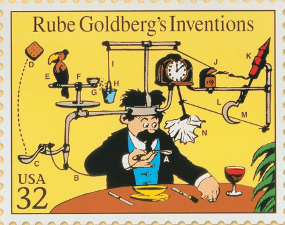A week has gone by since the reveal of the Hugo Awards shortlist. I think it safe to say that most everyone has been heard from at this point. At least it seems that way given the number of posts and newspaper articles I’ve read.
A lot of those posts and comments have referenced the No Award option, a voting strategy proposed last year that was largely successful. “No Award” has been an option for Hugo voters for several decades and had previously been used by the voters in exactly the same manner as it was used last year – to indicate that some (or all) nominees in a category, or even the category itself, should not have been on the final ballot.
It is true that last year saw the most widespread use of that option in the history of the awards, but then, last year saw the most widespread attempt to game the awards in the history of the awards. The response was proportional and measured – just as it has always been in the history of the awards.
This past week, much of the commentary on the No Awards strategy has opposed its repeated use this year. The gist of those arguments are: No Awarders are dancing to puppy tunes; No Awarders are punishing legitimate nominees who are being used as shields.
That last is what I’d like to focus on for a moment.
As predicted voluminously last year, both puppy slates consist of works that are considered to be “puppy picks” and works generally deemed to be legitimate nominees (works by authors who are known to have produced Hugo worthy items previously and/or works that do not align with puppy politics/by authors who have been targets of puppies). The tactic is an obvious one: to place voters in the quandary of either voting FOR a puppy pick or No Awarding someone/something that they generally approve of.
The first thing to point out is: no one knows what puppies approve of or disapprove of. Sure, there’s plenty of rhetoric that provides a generalized picture of what we assume their worldview is, but when it comes to individual works of fiction, graphic novels, podcasts & etc., we’re mostly just guessing. We can’t really say with 100% certainty that X is a shield and Y is a puppy fave. Granted, most of our guesses are probably right, but they are still only guesses.
Last year, the blockbuster film Guardians of the Galaxy (Best Dramatic Presentation: Long Form) was the sole puppy pick to win a Hugo Award. Most of the electorate justified voting for it by presuming that “it would have been on the ballot anyway”. (This is the same argument being advanced for many of the shields on this year’s ballot.)
I think it telling and an important fact that virtually every single mainstream news outlet that covered the Hugo Awards last year made it a central point to note the exception that was Guardians of the Galaxy.
In puppy words: “we’re winning and next year there will be even more Exceptions.”
My argument against slates has always been about the methodology, not the presumed issues that gave rise to them (be it push-back against diversity or the juvenile temper-tantrum that is Beale). My advancement of the No Award strategy (and I was not the only one to suggest it) was predicated on the idea that a hard and fast line could be established: either a work had been slated or it had not been. This directly addressed the methodology of the puppy protest, in effect saying “slates and campaigning are not the way to go about registering your protest”. It did not address the questions of whether or not their arguments were valid, nor did it shut them out of the process.
This, I believe, is a position that falls in line with the thinking of the vast majority of Hugo Award participants, who welcome anyone who wishes to join – so long as they respect the culture and institutions of the community. No one is saying to puppies “do not participate”. All that is being said is “don’t game the system”.
In conjunction with the No Awards voting strategy, I also strongly (and repeatedly) urged everyone who might have something nominated for an award last year or into the far future, to make a public statement that they do not want to be included on a slate and, if they become aware that they have been, they publicly ask to be removed. Further, I asked that voters respect those public statements and to treat such nominees as if they were not on a slate, should they appear on the ballot.
This strategy does not rely on compliance from puppies. This year there are several nominees who made such statements, found themselves on a puppy slate, asked to be removed and were ignored. I have no problem including those authors on my ballot. I am positive that the vast majority of voters have far less angst over including them in their votes than they do over other works that “would have been on the ballot anyway”, but which are not backed up by slate repudiation.
Absent repudiation, questions remain: are they happy to be on the ballot regardless of how they got there? Are they ok with being used as a shield? How will they feel if it turns out that some other, non-slated work was knocked off the ballot because they said nothing? (Recognizing that they have no control over placement on a slate is no cover for not having said anything previously.)
That’s harsh, I know. And probably undeserved for the vast majority of people who are caught up in this. But I see no downside to the essentially neutral statement “no one is granted the right to campaign for me”. Even those who claim they wish to be uninvolved in “the politics” ought to recognize that they are involved, whether they want to be or not. Silence can be interpreted in a thousand different ways. “Don’t involve me” is unambiguous.
Last year I voted my favorite movie off the ballot – because it was on a slate. I did my best to reach out to the film’s people and received no response. It genuinely pained me to not vote for it.
This year, I have those I consider friends to be on the ballot. It’s even harder to stick to my guns this year. But I am doing so.
***
EPH will likely be ratified this year. It is unlikely to have the positive effect we are hoping for, because up until now, the community has been reacting, has not been proactive. If EPH stymies current puppy strategies, does anyone think they are going to throw up their hands and walk away? Not after the victory of last year’s and this year’s shortlists. Not after last year’s victory with GotG. They’ll find some other way to “game the system”, because they are not going to stop. It only takes one to advance an insurgency (and that is what this is; it’s even been identified as such by the puppies themselves).
The only way we can successfully counter whatever unanticipated attacks things morph into going forward is to shield ourselves culturally, by putting ourselves in a position that allows us to ignore and discount whatever puppies may do that doesn’t respect the community.
No Awarding works that are on slates is one such action. Another is to publicly repudiate slates, especially if you might find yourself on one someday.
A third is to elevate the community’s well-established imperative against campaigning for votes to greater awareness. I’d like to see WSFS issue a formal statement, reminding everyone that campaigning is not something we do. I’d like to see those who are against slates, bloc voting, vote buying and all the rest saying so whenever the opportunity arises.
I’d like to see a a group of people familiar with the Hugo Awards process get together and form a ‘tiger team’ to game out the likely future actions of bad actors and propose ways to counter them.
And I’d like to see Kevin Standlee’s “Three Stage Voting” process proposed at this year’s Business Meeting and voted into acceptance. (If there’s a proper way to vote it in so that it can take effect next year, I’d like to see that happen as well.)
***
I’m one voice in this community. I’m voting my conscience. I urge everyone else to do so as well.
***
If you wish to make a statement regarding repudiating slates, you can use this page.
Steve Davidson is the publisher of Amazing Stories.
Steve has been a passionate fan of science fiction since the mid-60s, before he even knew what it was called.









I will vote my conscience by honoring great work. If it’s Hugo-worthy, I’ll rank it above No Award. If it’s not, I’ll put it below or leave it off my ballot. VD had no effect on what I nominated or didn’t nominate. He will not dictate what I decide is Hugo-worthy or not. I do not need creators to do anything other than create the best work they can.
fair enough!
“Amazing Stories is suggesting that potential award nominees go on record with a statement that rejects their participation and/or inclusion in voting slates, voting blocs and voting campaigns for genre awards” You mean if we want to eliminate someone all we have to do is nominate them LOL they will with draw and leave the field to the one we want to win?
” All that is being said is “don’t game the system”. Yes the is reserved for our betters they are the only ones who get to game the system
The idea that you’d expect a nominee to repudiate people who may have nominated them for an award is ludicrous on its face.
Why should any author or creator of something that others would enjoy choose to bother? The answer is simple. They wouldn’t. They shouldn’t. It’s is fundamentally an insult to those who’d otherwise nominated them in good faith.
Yes, in good faith. There is no reason to believe that someone should feel the need to think they were nominated for any reason other than merit. And if they don’t merit an award, then so be it.
To think that you are lock stock and barrel employing an ideology that stipulates one must repudiate something that they know nothing about is silly. Let me give you a clue, most makers of content aren’t embroiled in your political agenda that is the hallway-talk of Fandom. That makes you the easiest person in the world to game by those who’d even try to bother, and frankly – it seems that Vox Day delights in every one of your posts, because you play directly into his game.
What should you do with a bully? Ignore them. They’ll eventually get bored.
I’d suggest that you (and the few people who might follow this blog) ignore the silliness, because your histrionics feeds the one that you’re trying to go away.